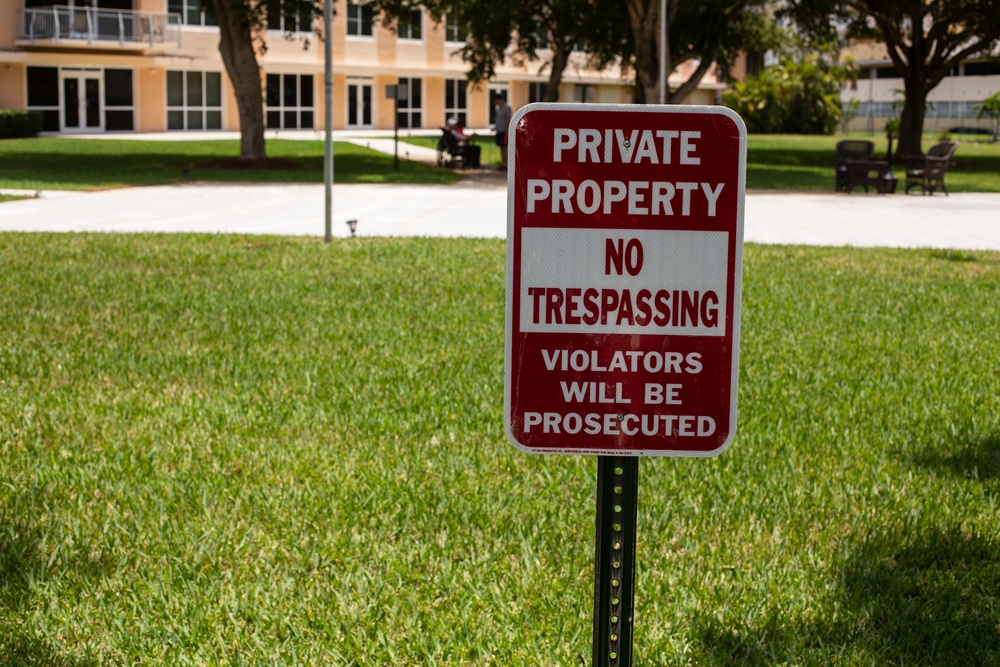Trust our experienced team to advocate for your rights and craft a strategic defense that addresses the specifics of your situation. Your ability to enjoy Maine’s outdoors and your legal standing matter – let us guide you through the intricacies of criminal trespass charges with unwavering expertise and dedication.
Call 207-571-8146 or contact us online to schedule a consult with one of our highly skilled criminal defense attorneys today.
Table of Contents
What is criminal trespass?
Trespassing is the act of going onto someone else’s property, despite knowing that you’re not allowed to do so. When it’s not a heightened charge of aggravated trespass, criminal trespass is a relatively minor offense, but is still surprisingly complex.
What are the penalties for criminal trespass in Maine?
The penalties for trespassing depend on where you were charged to have trespassed. Aggravated criminal trespassing is a Class C felony crime. This means that it comes with maximum penalties of five years in jail, and $5,000 in fines.
The most serious form of criminal trespassing, not including aggravated trespassing, is if you were charged with entering someone else’s house, or dwelling. If this is the case, the charge is for a Class D misdemeanor. The maximum fine that you could face would be $2,000, and the maximum jail time would be 364 days.
All other types of trespassing are Class E misdemeanors, which come with a maximum fine of $1,000, and a maximum prison sentence of 180 days. These types of criminal trespass include:
- Entering any structure that is locked or barred,
- Entering any place that is properly marked, or fenced, to keep trespassers out,
- Entering any place, or remaining there, despite a properly given warning to stay out or leave,
- Entering a cemetery at night, between half-an-hour after sunset and half-an-hour before sunrise, unless expressly allowed by law or posting.
Some of these ways of trespassing are fairly simple. Entering a house, or a locked or barred structure, is fairly straight forward, as is visiting a cemetery after hours. However, two of these ways of trespassing, #2 and #3, raise complicated legal issues.
Call 207-571-8146 or contact us online to schedule a consult with one of our highly skilled criminal defense attorneys today.
How Can Property Be Properly Marked to Keep Trespassers Out?
One way that trespassing can get tough to understand is when it has to do with property that has “No Trespassing” postings around it. Here’s the law, regarding how it works:
“A person is guilty of criminal trespass if, knowing that that person is not licensed or privileged to do so, that person… Enters any place from which that person may lawfully be excluded and that is posted in accordance [this law] or in a manner reasonably likely to come to the attention of intruders or that is fenced or otherwise enclosed in a manner designed to exclude intruders.”
There are several important elements, here.
The first element is the requirement that you can “lawfully be excluded” from venturing onto the property. You can’t get charged if you’re in a public park, and walk past “No Trespassing” signs, put there by people who want to have a private picnic – they can’t lawfully exclude you from walking there.
However, if you can lawfully be excluded from the property, then the landowner has to post his or her intention to keep trespassers out, so people know that they can’t go on the property. There are lots of ways that the landowner can do this. You’ve probably seen examples of one of the most popular ways: Putting up “No Trespassing” signs. These have to be placed no less than 100 feet apart. A less popular way is to use purple paint lines. These have to be conspicuously placed, and also within 100 feet of each other to be effective.
Before you get out a yardstick to measure the distance between signs, though, know that property is successfully posted if it can be determined that the landowner’s intention to keep people off their land was “reasonably likely” to come to a visitor’s attention. If two purple paint stripes are 101 feet apart, but you saw one of them and you got charged for criminal trespass, and if it later comes out that you saw the sign, then it probably won’t matter that the stripes are too far apart.
Whether these postings for “No Trespassing” are “reasonably likely to come to your attention,” though, is a factually difficult thing to determine. Criminal defense attorneys like William T. Bly love it when these kinds of issues crop up. It gives them an opportunity to sow reasonable doubts into a jury’s mind about whether you knew that you were trespassing.
What is the right way to give trespassers a warning in Maine?
Criminal trespass in Maine is knowingly entering a dwelling place, locked structure. Further, criminal trespass includes when one enters any place from which that person may lawfully be excluded and that is posted. 17-A M.R.S.A. § 402.
Landowners can make it illegal to visit or stay on their property by personally letting you know. This can be in writing, or verbally, and can be done by either the landowner or by someone with the landowner’s agreement.
Call 207-571-8146 or contact us online to schedule a consult with one of our highly skilled criminal defense attorneys today.
How can a criminal trespass attorney help?
One way that criminal defense attorneys defend against trespassing charges is to argue that you didn’t actually know you weren’t allowed to be on someone else’s property. “Knowing” something is a tricky thing for the prosecution team to prove, and they have to do it beyond a reasonable doubt in order to get a criminal conviction for criminal trespass. A good criminal defense attorney is aware of this difficulty, and will use it to great effect in defending someone charged with criminal trespass. If it can be shown that you were unaware of where you were, or made a mistake and ended up in someone’s property, or that postings or a warning to leave were not given, then your criminal charges for trespassing should not turn into a criminal conviction. And all that it takes to make this happen is to put a lingering doubt in the jury’s mind.
However, in addition to Maine’s criminal trespass laws, our state also has an additional trespassing law, called aggravated criminal trespass. This law recognizes that some acts of trespassing are relatively benign, and barely hurt anyone – like walking past a “No Trespassing” sign on a 140-acre farm and wandering around the cornfields – but that others can be considered more serious.
In Maine, aggravated criminal trespassing is when you:
- Enter someone’s “dwelling place,”
- Without permission or privilege,
- And either:
- Commit a crime from Chapter 9 or Chapter 11 of Maine’s criminal code, or
- Have two prior convictions for burglary or aggravated criminal trespass.
Let’s delve into each of these elements in detail.
Entering Someone’s “Dwelling Place”
This is the first requirement that can turn an act of normal trespassing into one of aggravated criminal trespassing. The reason is fairly clear: Walking uninvited into someone else’s house is viewed as a major violation of privacy, and is something that rarely happens on accident, so the state of Maine has decided that there should be higher penalties if it does happen.
Importantly, Maine’s aggravated criminal trespass law uses the word “dwelling place.” Elsewhere in Maine’s criminal code, a “dwelling place” is defined as:
“A structure that is adapted for overnight accommodation of persons, or sections of any structure similarly adapted. A dwelling place does not include garages or other structures, whether adjacent or attached to the dwelling place, that are used solely for the storage of property or structures formerly used as dwelling places that are uninhabitable. It is immaterial whether a person is actually present.”
This long, legal-sounding definition seems like a 63-word way of saying the word “house.” However, there are certain differences between this definition of “dwelling place” and “house” that can make the difference between facing a charge of aggravated or normal criminal trespass. For example, a building that has been condemned, or an attached garage.
Call 207-571-8146 or contact us online to schedule a consult with one of our highly skilled criminal defense attorneys today.
Without Permission or Privilege
Permission and privilege are often subtly difficult ideas, especially in the eyes of the law. Examples of people that have a privilege to visit are firefighters or postal workers, when they’re on the job. The reasoning is simple: If either of these workers had to ask for permission to come onto your property every time they needed to visit, you wouldn’t get your mail, and your house will have burned down.
Permission is often much harder to determine. People rarely tell each other, “You are allowed to visit my dwelling place.” Instead, people often try to figure it out, depending on social clues and context. Unfortunately, people make mistakes, especially in these kinds of situations.
How to Defend Against Criminal Trespass in Maine
A criminal defense attorney has lots of ways to defend against a charge for aggravated criminal trespass. All of the elements that we discussed above are up to the prosecutor to prove in trial, to a jury, beyond a reasonable doubt. Regardless of what you may have heard from others in the criminal system, this is not a low standard for the prosecutor to reach. Solid criminal defense attorneys know how to prevent prosecutors from meeting that standard, through challenging the prosecutor’s facts and evidence, and by arguing that the prosecutor’s case does not satisfy what the law requires for a conviction.
When it comes to aggravated criminal trespass, examples of what a criminal defense attorney would argue would be that the trespass did not occur in someone’s “dwelling place,” or that no additional crime was committed that would turn the charge from trespassing to aggravated trespassing. Whether you had permission to be on the property is another example.
These are just a small sample of the specific ways that criminal defense attorneys would fight a charge for aggravated criminal trespassing. There are also all of the methods and techniques that defense lawyers use to defend people against all sorts of criminal charges. These include challenging and impeaching witnesses, using prior statements to damage their credibility, attacking the foundation of the prosecutor’s evidence, and using the hearsay rule.
Contact Our Criminal Trespass Lawyers in Maine
The Maine Criminal Defense Group is regarded as one of the best criminal defense attorneys in the state of Maine. By using these criminal defense methods, as well as others that he has learned, honed, and perfected over years of experience and countless trials, he has accumulated an impressive track record of successfully defending clients against a wide variety of criminal charges. Contact our office to schedule an appointment today or call us directly at (207) 571-8146.
Call 207-571-8146 or contact us online to schedule a consult with one of our highly skilled criminal defense attorneys today.
Blog Posts


Self-defense laws in the U.S. are complex, vary from state to state, and are often misunderstood. “Stand your ground” laws allow an individual to use deadly force in self-defense in[...]

Every day in Maine, people are charged with crimes that they did and did not do. Fortunately, in the U.S., we have a justice system that says you’re innocent until[...]

Expungement is the practice of legally erasing or striking out documents or information relevant to criminal charges. It’s not possible to expunge a criminal record in Maine. However, other avenues[...]

Domestic violence cases can be some of the most challenging to deal with for everyone involved. Families with children can be thrown into turmoil with emotions running high. Many people[...]

If you have been arrested or are under investigation for a crime in Maine, it is crucial to retain the services of a competent and experienced criminal lawyer. A criminal[...]

Bail Code in Maine Title 15, Chapter 105 of the Maine Revised Statutes governs all issues pertaining to bail in Maine. When a defendant has been arrested and charged with[...]

In the span of less than 5 decades, computers have utterly transformed our society. Those of the baby boomer generation will be able to appreciate the scale of this transformation[...]

Financial crimes can be among the most destructive to individual victims and to society as a whole. These crimes can also be among the most difficult to punish, because these[...]

If you’ve been charged with assault in Maine, your priority should be to ensure that the charge does not result in a conviction. Assault can be charged as a misdemeanor[...]


